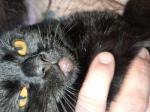Cats and Plants
Cats and plants have an interesting relationship. Given that cats are carnivores, you'd think that the subject of felines and vegetation wouldn't come up much...
Hey, aren't you a meat eater?
But there are a host of reasons, from behavior to nutrition to safety, to talk about plant life with respect to your cat.
Here's what I think you should know...
First of all, various plants that are toxic to cats can be found living in many homes.
In fact, a good number of households may have more than one plant that is poisonous to cats. Despite this, some of these homes also have cats living there!
Second, any cats outdoors may encounter plants that are harmful to them as well. So it is very possible that your cat, whether an indoor or outdoor cat, may encounter a plant toxic to cats.
It is important, therefore, for you to be able to recognize a symptom of cat poisoning, or at least know which poisonous plants may be in the area that your cat frequents. When I say poisonous plant, I do mean a poisonous plant for cats, not people. Felines can have adverse reactions to plants that are perfectly harmless to humans.
Nutrition and Behavior
If you review the ingredients of any commercial cat food, you will more than likely find an edible plant or two on the list. Corn, rice, and wheat, in various forms, are often listed on the label.
There are different reasons for adding the different types of plant matter to the food, including one of economy... plant matter can be used as a cheap filler to add bulk to the food.
Let's face facts. Corn is not the best source of protein for your cat, meat is.
But there are some nutrition and health reasons to have some plant matter in cat food, too. Fiber, especially in hair ball formula or weight management foods is a common reason.
Additional fiber (which is obviously not found in meat) in the diet also can aid in relieving symptoms of certain digestive problems and conditions in your cat.
There is some debate in the veterinary medical community, however, over the effectiveness of dry food hairball formula cat foods. Many holistic vets are recommending that you instead add non-spiced canned pumpkin to a premium quality wet food in order to control hairballs.
In addition, cats will often seek out and consume plant matter on their own, much to the frustration of many cat owners. Many cat owners cannot understand (or control) their cat's strong desire to eat their house plants. Sometimes the behavior is just plant eating, others it's digging in the the dirt as well.

Note: If you have a cat that's a plant eater, I understand. One of my cats (Teddie) is a fiend when it comes to eating plants! If she even thinks there's a plant or flowers in the house, there she is. She almost always gives back what she eats, too!
Commercial cat grasses are sold for just this reason. You can grow a small, cat safe garden in your home. Your cat can eat the grass and/or dig in the dirt to satisfy her craving and no one gets hurt.
Answers from experts as to exactly why cats want to eat grass (or other plants) are given from "unknown" to "your cat may need to vomit" to "boredom."
It is known that certain plants (such as some grasses) can provide certain nutrients as well as some roughage. Also, in the wild, a cat would eat small animals whole, bones and stomach contents and all, ingesting whatever plant matter that animal may have eaten.
Exactly why your cat may need to vomit (or feel the need to eat plant matter) is obviously a secret known only to your cat. Perhaps a hair ball that won't come up?
What about catnip?
About 80 percent of cats are affected by catnip, a member of the mint family. You can sometimes use catnip to attract your cat and pull her away from that flower arrangement you don't want her to eat.
More about growing catnip.
In contrast, a number of plants can be used as natural cat repellents. In fact, the ingredients of some commercial cat repellent products are based on plants.
List of Poisonous Plants for Cats
When it comes to poisonous plants and cats, the best place to get the straight scoop on the possible dangers is a good list of plants that are poisonous to felines.
There are a number of resources on the web and elsewhere that have toxic plant lists, but by far the one I would rely on the most is the toxic plant list from the ASPCA Animal Poison Control Center. Many web sites have paid honor to this list by simply reproducing it.
I've done some research on toxicity with cats and tomatoes, both with respect to the plant (outdoor cats in the garden should stay away), and to the fruit itself, which is found in some cat foods.
I've also included a number of resources below that you can use...
When Cats and Plants Don't Mix: Allergies and Toxins
When cats and plants don't mix, the results can be anything from mild nausea, all the way to kidney failure and death!
Many plants can cause a mild allergic reaction or gastric upset in cats, which may include vomiting. In fact, almost any raw plant matter ingested by your cat can cause vomiting, as well as depression and disorientation.
Some poisonous plants, however, can result in death if your cat consumes it. In some cases these are very common household plants!
Otherwise healthy cats and plants (that may be perfectly harmless to humans) can combine for severe reactions, including death. In some cases, there are no initial symptoms.
For example, sometimes just chewing on the leaves of a plant can cause kidney failure within a few days. Just remember that in general, cats and plants don't mix. Whether it is a mild allergic reaction, or a severe health issue, cats and plants should normally be separated.
For more information, including specific plants and reactions, take a look at my suggested reading below.
Suggested Reading and Resources
Catnip Oil and Your Cat -- The effects of catnip on kitties.
For more information on cats and plants with respect to poisons, you can contact the National Animal Poison Control Center (NAPCC) at the University of Illinois College of Veterinary Medicine. The phone number is 1-800-548-2423 (there is a charge for this call).
For details, see the following web pages for more information...
Poisonous Plants and Pets Don't Mix -- Information from the University of Illinois College of Veterinary Medicine.
Houseplants and Cats -- Advice from veterinarypartner.com on keeping cats away from plants.
Common Poisonous Plants -- Information on pets and poisonous plants from The Humane Society of the United States.



Comments: What do you think?
Have your say about what you just read. Leave me a comment in the box below.